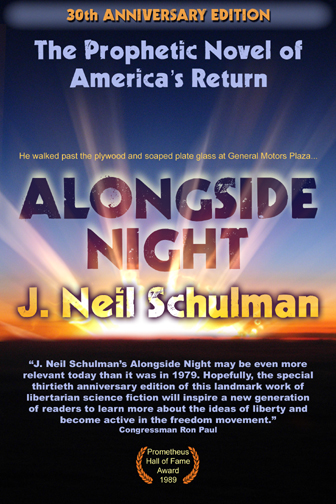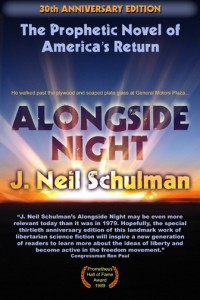
AM: Right off the bat, it strikes me that I don’t know what to call you. Will Neil work?
JNS: Sure. It’s J. Neil Schulman in credits, and Neil in person.
AM: Anyway, thank you for doing this interview, Neil. You’ve had a fascinating and unique career. You’ve written novels, short fiction, nonfiction, screenplays, and other works. Which of your works is your favorite and why?
JNS: Every artist gets asked this question sooner or later. I asked it of Robert A. Heinlein when I interviewed him in 1973, and his answer was, “The latest one I’ve been working on.”
I’ve only completed one movie so far — Lady Magdalene’s — so it’s a Hobson’s Choice on that one. Ask me again when I’ve made two! But a lot of people also seem to like the script I wrote for The Twilight Zone, “Profile in Silver.”
I’ve written three novels. My first, Alongside Night [editor’s note: free in pdf], seems to be my most accessible and popular. I consider my second novel, The Rainbow Cadenza, to be my most layered, literary, and richest in explicit philosophy. My third novel, Escape from Heaven, is my favorite. It may not be as timely as my first novel or literary as my second novel, but it’s the one that’s closest to my heart…both the funniest thing I’ve ever written, and the one which is most deceptively simple. It appears to be a lightweight piece of comic fantasy, but it’s full of ideas that if examined more closely turn both traditional theology and rationalist philosophy on their heads.
Short stories? I’ll pick a few: “The Musician,” “Day of Atonement,” and “When Freemen Shall Stand” — all in my collection Nasty. Brutish, and Short Stories — and my latest short story, “The Laughskeller,” published on my blog, J. Neil Schulman @ Rational Review.
AM: Your worldview is, in a word, libertarian. Why is that? How does libertarianism come across in your writing?
JNS: In my nonfiction essays it comes across explicitly. In fiction, drama, and comedy, I try to examine libertarian themes without preaching. I was probably most subtle doing this in The Rainbow Cadenza. The utilitarian politics advocated by the chief villain, Burke Filcher, is so self-consistent that a lot of readers have thought this character speaks for the author. In fact, I wrote the novel to attack utilitarianism as a nullification of the natural individual rights I believe in. The novel reduces utilitarianism to absurdity — it’s a formal satire of it.
Alongside Night is less subtle, though I’m probably more successful in the new movie script than the 1970s novel when it comes to letting the audience make up its own mind. I have learned some refinements of my craft in the last three decades.

AM: I recently noticed that you commented on a post at the Austrian Economics and Literature blog edited by my good friend Troy Camplin. Tell me about the influence that Austrian economics has had on you.
JNS: I would say that Austrian economics — and more fundamentally, the analytical tools of praxeology and games theory — have been fundamental to my work for my entire professional career. They’re not the only tools in my kit, but they get shopworn as much as any of them. Austrian economics is most explicit in Alongside Night, projecting the social and political consequences of fiat money hyperinflation — but I used games theory in plotting “Profile in Silver” and applied praxeology to the afterlife in Escape from Heaven.
AM: What are some of your latest projects? Is there anything you’re working on that our readers should be anticipating?
JNS: That’s the easiest question you’ve asked me. I’m in production on the movie I adapted from Alongside Night, and won’t be working on much of anything else until it’s done. I’m the screenwriter, the producer, and the director. I’m even acting in one of the supporting roles. I’ll be supervising every phase of post-production and making the plans and deals for distribution.
AM: You’ve written in a variety of genres? Do you prefer one above the others?
JNS: I never write within a genre. I consider genres to be artificial marketing categories designed to make writers imitate past successes. I use Louis Sullivan’s architectural principle of “form follows function.” So it’s my goal to let the internal logic of characters and story determine “what happens next” — no matter what premises this requires and where it takes me. I have within my unwritten-stories file a multigenerational saga that starts in the past as historical fiction, continues in present day as “mainstream,” and concludes in the future as science fiction. How could I ever write that if I believed in the limits of genre?
AM: Okay, to end, I want to ask, what are you reading right now? What does a guy like you read for pleasure on a day-to-day basis?
JNS: I have tons of news and related text I need to read on a daily basis simply to stay current.
Reading for pleasure? I’ve promised my daughter that I’ll finish the Harry Potter series before I get on to anything else — but I do have a movie to finish first!
AM: Thank you so much, Neil, for taking the time. I want to make sure we do this again soon. There are other things I want to ask, but I’ll have to hold off for another day.
JNS: My pleasure.















